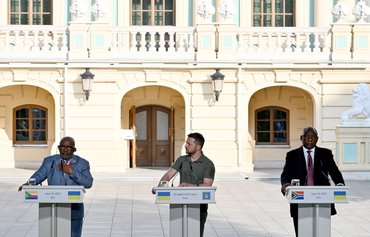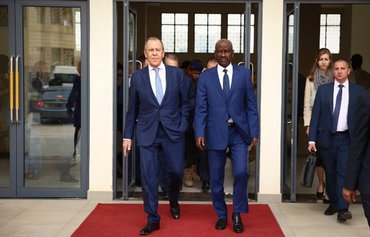NOUAKCHOTT, Mauritania -- With many African countries dependent on grain imports from Ukraine and Russia, Moscow's withdrawal from the Ukrainian grain export agreement has raised alarm on the continent.
Russia recently refused to extend the deal, brokered last year by the United Nations (UN) and Türkiye, that had allowed safe passage for grain leaving Ukrainian ports for world markets -- including Africa -- via the Black Sea.
The deal helped stabilise global food prices and avert shortages amid Russia's ongoing assault on Ukraine. But following Moscow's pullout, prices have risen.
In an article published on the Kremlin's website on July 24, Russian President Vladimir Putin attempted to justify the decision to withdraw, saying the deal "has become meaningless".
![Russian President Vladimir Putin meets with Burkina Faso junta leader Capt. Ibrahim Traore outside St. Petersburg on July 29. Burkina Faso is one of six African countries to benefit from Russian 'grain aid'. [Alexey Danichev/Pool/AFP]](/cnmi_am/images/2023/08/01/43261-Putin-Burkina-Faso-600_384.jpg)
Russian President Vladimir Putin meets with Burkina Faso junta leader Capt. Ibrahim Traore outside St. Petersburg on July 29. Burkina Faso is one of six African countries to benefit from Russian 'grain aid'. [Alexey Danichev/Pool/AFP]
![Malta-flagged bulk carrier M/V Rojen, carrying grain from Ukraine, sails along the Bosphorus Strait on August 7, after Ukraine and Russia signed a deal aimed at relieving the global food crisis. Russia has since withdrawn from the agreement. [Yasin Akgul/AFP]](/cnmi_am/images/2023/08/01/43262-Ukrain-grain-deal-600_384.jpg)
Malta-flagged bulk carrier M/V Rojen, carrying grain from Ukraine, sails along the Bosphorus Strait on August 7, after Ukraine and Russia signed a deal aimed at relieving the global food crisis. Russia has since withdrawn from the agreement. [Yasin Akgul/AFP]
Putin's article, "Russia and Africa: Joining Efforts for Peace, Progress and a Successful Future", was published three days ahead of the second Russia-Africa summit, held in St. Petersburg last Thursday and Friday (July 27 and 28).
In it, Putin tried to reassure African countries, saying their grain needs would be met by Russia "on a commercial basis or for free".
He announced that Russia will ship up to 50,000 tonnes of grain aid to six African nations -- Mali, Burkina Faso, Zimbabwe, Somalia, Eritrea and the Central African Republic (CAR) -- in the coming months.
But UN Secretary-General António Guterres last Thursday pointed out that grain donations to developing nations cannot compensate for the impact of Moscow's cutoff of grain exports from Ukraine, the Associated Press reported.
Taking millions of tonnes of Ukrainian grain out of the global market will lead to higher prices, which "will be paid by everybody, everywhere", he said.
African economists and analysts also downplayed the significance of Putin's announcement and its political ramifications on the economic future of African countries, describing it as a political manoeuvre to gain more time.
'Cruel blow to Africa'
"Russia's withdrawal is an extremely cruel blow to Africa, whose countries are highly dependent on Ukrainian grain," Mauritanian economic researcher Hussein Mohamed Omar told Al-Mashareq.
Ukraine accounts for a large portion of African imports of wheat.
"Somalia, for example, relies on Ukraine for 70% of its wheat supply, while Tunisia and Libya rely on it for 50% and 40%, respectively," he said.
Omar predicted the blockade on the export of Ukrainian grain to Africa would lead to "food insecurity crises in some of these countries, especially in view of the climate change crisis and export and storage restrictions".
Through the African-Russian summit in St. Petersburg, Russia sought to persuade the leaders of African countries that it cares about their interests.
A few days before the publication of Putin's article, Russian deputy foreign minister Sergey Vershinin also attempted to assuage the concerns of African countries.
During a news conference, he said the countries in need "will get the grain through our communication with them or through the Russia-Africa summit".
According to some analysts, Moscow's economic importance to African countries is not as great as it is made out to be.
"Some countries exaggerate Russia's role based on wrong calculations, while humanity can live without the 'Russian bear', economically and commercially," said Maghreb contemporary history researcher Kabad Abdul Rahman.
Millions will pay the price
"Russia's economic policy in Africa is a living example of the failure of a country mired in crises," Abdul Rahman told Al-Mashareq.
"The Russians' self-promotion in Africa does not make a bit of difference, because Putin's domestic policy is incapable of imagining solutions," he added. "How do you clothe people when you yourself are naked?!"
Russia's decision to withdraw from the grain agreement sparked strong reactions, given the extremely difficult humanitarian conditions that would result from it for millions of Africans.
Berlin described it as "bad news", and Washington described it as "unconscionable", while the UN said millions would "pay the price".
"Moscow's move proves that Putin does not care much about the interests of the African peoples," economic researcher Hussein Muhammad Omar said. "It can rather be described as reckless and indifferent toward Africans."
"Putin does not care about the interests of poor countries," he added. "He is interested only in achieving battlefield gains in his war against Ukraine, without taking into account the situation of poor people who have nothing to do with that war."

![The first UN-chartered vessel, MV Brave Commander, loads grain to export to Ethiopia in Yuzhne, Ukraine, on the Black Sea coast, last August 14, after Kyiv and Moscow signed a deal to unblock Black Sea grain deliveries. Russia has since announced it will withdraw from the deal. [Oleksandr Gimanov/AFP]](/cnmi_am/images/2023/08/01/43263-Ukrain-grain-loading-600_384.jpg)






